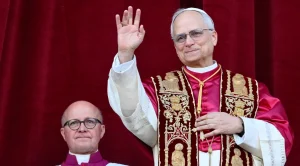In what was described as historic, Montreal Roman Catholic Archbishop Christian Lépine and Apostolic Nuncio Luigi Bonazzi, the Vatican’s diplomatic envoy to Canada, visited Cummings House, the headquarters of Federation CJA, on Oct. 27.
The occasion was the 50th anniversary of Nostra Aetate, the landmark Vatican declaration on the Church’s rethinking of its relations with non-Christian religions.
Significantly, it recognized the Church’s roots in Judaism and rejected blaming the Jewish People for killing Christ, thereby establishing unprecedented mutual respect and paving the way for the establishment of diplomatic relations between Israel and the Holy See in 1993. Nostra Aetate is Latin for “in our time.”
At the private reception, Archbishop Lépine, 64, said he has enjoyed good relations with the Jewish people throughout his life and ministry. He was appointed archbishop in 2012.
“I rejoice in the spirit of friendship I have always known [with Jews]… It’s like a gift that God has given us.”
Peace, he said, is important to Christians and Jews, and all humanity, and there is hope for the world if people of different beliefs pursue this goal.
“Your invitation calls upon me to contribute in this spirit of friendship and mission of peace,” he said. “We need God’s peace in ourselves and between ourselves.”
Hosted by the Centre for Israel and Jewish Affairs (CIJA), the event was attended by its chair David Cape and CEO Shimon Koffler Fogel, federation immediate past president Susan Laxer and other leaders, rabbis from different denominations, priests and nuns, and diplomats, notably Israeli Consul General Ziv Nevo Kulman.
“Tonight we celebrate the jubilee of Nostra Aetate, the document that implemented a major turning point in relations between the Catholic Church and Judaism,” said Luciano Del Negro, CIJA Quebec vice-president.
“Proclaimed 50 years ago by Pope Paul VI, this declaration recognized the common spiritual heritage of Jews and Catholics, and condemned all forms of hate, persecution and manifestations of anti-Semitism.”
He noted that CIJA’s Canadian Rabbinic Caucus and the Canadian Conference of Catholic Bishops recently entered into dialogue.
Rabbi Reuben Poupko, co-chair of the Rabbinic Caucus, who could not be present because he was out of town, stated: “That a theological event should merit celebration is in itself remarkable. What is even more noteworthy is that this theological shift actually worked. Nostra Aetate has ushered in an entirely new era in the history of the relationship between the Catholic Church and the Jewish People.”
According to 2011 statistics, three-quarters of Quebecers identify as Catholic, by far the largest proportion in any province.
Rabbi Poupko, spiritual leader of the Orthodox Congregation Beth Israel Beth Aaron, added: “Nostra Aetate is predicated on a simple, yet profound, idea, that if one claims to believe in one God, by logical and ethical necessity, you must therefore believe in one race. We are all the children of God. That idea should create bonds between us that are unbreakable.”
The private gathering preceded a public event at the Jewish Public Library, presented in collaboration with Christian-Jewish Dialogue of Montreal and CIJA.
The guest speakers were two veterans of Christian-Jewish rapprochement: Jean Duhaime, retired professor of biblical interpretation at the Université de Montréal, and Armand Abécassis, a philosophy professor at the Université Michel-de-Montaigne in Bordeaux, France, moderated by Sylvia Assouline, a Christian-Jewish Dialogue member.
Two other public events held last week under Christian-Jewish Dialogue’s auspices examined current and future challenges in relations between the two faiths.
Rabbi Schachar Orenstein of the Spanish and Portuguese Synagogue and Patricia Kirkpatrick, a McGill University professor of biblical interpretation and an ordained Anglican minister, spoke at McGill’s Birks Chapel on Oct. 29, an exchange that touched on how Israel fits into dialogue.
An afternoon of workshops was held at the Grand Séminaire de Montréal on Nov. 1 on the question of “Where Are We Going From Here?” moderated by Eta Yudin of CIJA and Sonia Sarah Lipsyc of the Communauté sépharade unifiée du Québec.
At Shabbat services Oct. 30, Archbishop Lépine delivered the guest sermon at Temple Emanu-El-Beth Sholom, a congregation his late predecessor, Jean-Claude Turcotte, had addressed on several occasions.






